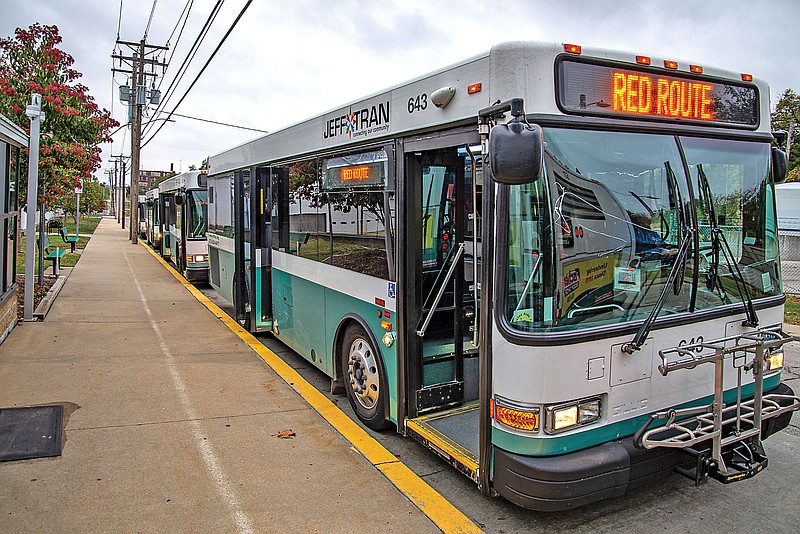A change to the JeffTran fares could face issues garnering support unless something comes along with it.
The Public Transit Advisory Board (P-TAB) discussed increasing fares Tuesday, but the committee members want to see an expansion of services along with it.
Board members said they would support a 25 cent increase on two conditions: a benefit to the community that uses the bus system and for a fare increase to come after the CARES funding allocated to transit is used.
The JeffTran system charges $1 per ride, and people can apply for a reduced fare of 50 cents per ride. The city's paratransit system, Handi- Wheels, charges $2 per ride.
The discussion of increasing fares came by request from the Public Works and Planning Committee after it was discussed during the budget process for the 2022 budget.
City council members in July voiced concern the transit system doesn't pay for itself, but requires funding from general revenue to cover expenses.
According to previous city budgets, in 2015 the transit department spent $505,166 more than it brought in. In 2018, the system ended the year $115,656 in the red, which is the lowest amount in the last six years.
The city discussed a 50 cent fare increase in 2015, but it didn't go through because of opposition from the community. Fares have stayed the same since 2007.
Fares make up around 7 percent of the department's revenue, with about 25 percent coming from the city budget, 10 percent from the state and 56 percent from the federal government for the 2021 budget. The budget itself totaled $2,577,604.
P-TAB member Wayne Lee said he opposed the fare increase in 2015 because there's a cost to raising fares both for the city and for the people who use the system.
For instance, the department doesn't handle very much change since the cost is $1 for the majority of rides. However, by increasing it by 25 or 50 cents - like council members suggested - there will be more coins for staff to count, sort and deposit at the bank.
"That's not even close to the major reason," Lee said. "A person who is on a fixed income is going to receive a check for an amount anywhere from $800 to $1,000 a month. That's it. That's all their money and 25 cents for them, could be like for most people $5 or $10. If you're going to board a bus that's going to take you anywhere you may be going in this city, would you pull out a $10 bill and use that to pay your fare?"
While he isn't opposed to increasing the fares, Lee said he would only support it to start after the city's used the $2.3 million in CARES funding that is allocated to transit.
Transit Director Mark Mehmert said the department is also supposed to receive $700,000 in American Rescue Plan funds.
Some of that money, he said, has already been used to cover pandemic- related expenses.
Mayor Carrie Tergin said in her letter to go with the 2022 budget the extra federal funding is a temporary solution for an ongoing revenue issue.
P-TAB member Angela Hirsch said she also opposed the increase in 2015. While she still has some concerns about increasing it, she said she isn't against the idea.
At the time, she said, the city was just coming off the American Recovery and Reinvestment Act of 2009 - which was a response to the 2008 recession.
"People were just starting to get back to work," she said. "I feel like right now, we're in a position where there's still a lot of people who are either unemployed or underemployed. That's the majority of our ridership."
Hirsch said she recognizes the cost of maintenance, labor and supplies such as gas have gone up since 2007.
"On the other hand, everything is more expensive. You have to pay your workers a living wage, the drivers have been able to make a living doing this work. That's not cheap. You hear a quarter here a quarter there it doesn't sound like a lot to most of us, but to those who are literally counting their quarters that's a lot."
P-TAB member Glenn Bonner suggested a fare increase may face less opposition if it came packaged with additional hours or weekend hours.
Buses run six fixed routes from 6:40 a.m.-6 p.m. along Business 50 East, Capital Mall, High Street East and West, Missouri Boulevard and Southwest Boulevard.
Mehmert said extending hours or days would trigger larger changes within the transit department. It would mean more drivers, maintenance and dispatchers to respond to the demand.
Drivers typically work the full day with an extended lunch break in the afternoon, but extending even by one hour later into the evening, Mehmert said, would require changes.
"We're doing it as efficiently as we can," he said. "(T)here are obstacles to (extending hours). We're not trying to say that these obstacles are insurmountable, or should not be considered. Those are just things to keep in mind."
All of the committee members agreed if a fare increase happens, the community who uses the bus system should see something in return.
Mehmert said 173,541 people used the JeffTran system in 2020 and 38,892 people used the Handi-Wheels system, but the pandemic brought the number down.
In 2019 that number was 220,087 for JeffTrans and 50,949 for Handi-Wheels. The peak in the last five years came in 2017, with 235,306 users on the fixed route and 51,930 paratransit users.
"Transit is not designed to be, and never has been, a moneymaker," Hirsch said.
Mehmert said staff will work on a proposal and bring it forward at the next P-TAB meeting in January.

